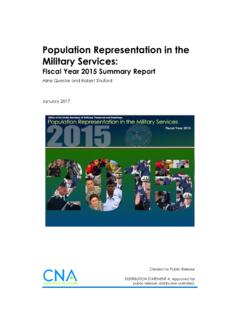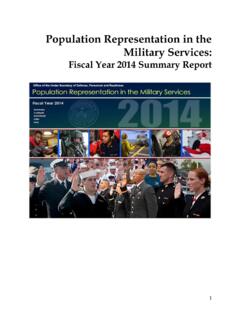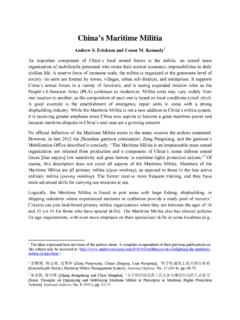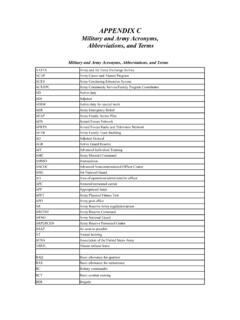Transcription of ) Russian Military Strategy: Core Tenets and Operational …
1 DRM-2021-U-029755-Final DISTRIBUTION STATEMENT A. Approved for public release: distribution 2021 Russian Military Strategy: Core Tenets and Operational Concepts Michael Kofman, Anya Fink, Dmitry Gorenburg, Mary Chesnut, Jeffrey Edmonds, and Julian Waller With contributions by Kasey Stricklin and Samuel Bendett Approved by: August 2021 Michael Kofman, Research Program Director Russia Studies Program Strategy, Policy, Plans, and Programs Division Request additional copies of this document through Copyright 2021 CNA. Abstract This paper explores the core Tenets of Russian Military strategy and associated Operational concepts, situating its role within the Russian system of knowledge on Military security. Russian Military leaders describe the prevailing strategy as active defense, a strategic concept integrating preemptive measures to anticipate and prevent conflict, wartime concepts of operations that seek to deny an opponent decisive victory in the initial period of war, degrading and disorganizing their effort, while setting the conditions to attain war termination on acceptable terms.
2 The strategy emphasizes integration of defensive and offensive operations, maneuver defense, sustained counterattack, disorganization of an opponent s command and control, engagement of their forces throughout the theater of Military action, including infrastructure in their homeland. Its theory of victory is premised on degrading the Military -economic potential of opponents, focusing on critically important objects, to affect the ability and will of an adversary to sustain a fight, as opposed to ground offensives to seize territory or key terrain. The study also explores the content of Russian strategic operations, associated missions and tasks, the echelonment of Russian Military concepts, together with Russian outlooks on the theory and practice of modern warfare. This document contains the best opinion of CNA at the time of issue.
3 It does not necessarily represent the opinion of the sponsor Distribution DISTRIBUTION STATEMENT A. Approved for public release: distribution unlimited. 08/06/2021 This work was performed under Federal Government Contract No. N00014-16-D-5003. Cover image credit: "В Минобороны России пройдет Единый день приемки военной продукции" [The Russian Defense Ministry will host a single day for the acceptance of Military products], Министерство обороны Российской Федерации (Минобороны России) [Ministry of Defense of the Russian Federation], March 24, 2017, CNA Research Memorandum | i Executive Summary Russian Military leaders describe the current Military strategy as one of active defense. This concept has a deep history in Soviet Military thought, evolving from an Operational discussion towards a strategic framework in the late-Soviet period.
4 In Russia, Military strategy represents the highest form of Military art, offering general Tenets on the theory and practice of war, preparation for national defense, ways of preventing conflict, managing forces in wartime, and delineation of strategic operations. Taken together, the Military strategy and associated Operational concepts shed light on the Russian way of war, influences, and central thesis. Russian strategy reflects choices in planning, Operational concepts, and the force structure or capabilities to realize them. This study interrogates the choices made in Russian Military strategy, under the rubric of active defense, their underlying thesis, and expression in strategic- Operational concepts. The notion of activity in Russian Military strategy describes both preventative measures taken before a conflict breaks out, to deter it, along with Tenets for conducting the war.
5 During a threatened period, or escalating crisis, Russian forces take preventative measures to neutralize threats, which can include preemptive use of limited force in a time of perceived imminent threat. A defensive strategy emphasizes maneuver defense, and counterattack. It is a defensive-offense that envisions persistent engagement of an opponent throughout the theater of Military action, to include critical infrastructure in their homeland, executing strategic operations that affect an adversary s ability or will to sustain the struggle. Consequently, Russian Military strategy is comprised of Operational concepts that represent defensive and offensive constructs without clear distinction. Active defense devalues strategic ground offensives, privileging the aerospace domain, maneuver defense, and forms of noncontact warfare.
6 The sense of active within active defense envisions demonstrations or limited use of force, to convince opponents that the costs of aggression would exceed desired benefits. From a Russian perspective, states chiefly use non- Military means, and indirect approaches, to achieve political goals. Hence the Russian Military seeks to offer answers to what the state perceives as forms of undeclared warfare, containment, and coercion. However, the nature of war is understood as one where non- Military means are effective because they are backed by technologically advanced Military capability. A strategic conventional offensive remains decisive in the initial period of war. The principal threat envisioned is an integrated massed air strike against critically important objects of Military , economic, and political significance in Russia.
7 The strategic nature of long-range precision guided weapons, and other forms of non-kinetic attack, like electronic warfare, are foremost in Russian Military considerations. CNA Research Memorandum | ii Active defense seeks to answer this threat, addressing the use of indirect means during a tentative period of danger, or threat, and the Military challenge posed by a technologically advanced opponent armed with strategic conventional capabilities. The strategy s general Tenets are achieving surprise, decisiveness, and continuity of strategic action. Identifying an opponent s vulnerabilities, finding asymmetric counters to neutralize their advantages, and seizing the strategic initiative. It envisions warfighting defined by fire, strike, and maneuver, where tactical formations engage each other at distances, and recon-strike contours enable warfare at standoff ranges.
8 The battlefield is seen as fragmented, or non-contiguous, without fixed battle lines, where radio-electronic means integrate with traditional fires and strikes to execute a complex defeat of an opponent s Military effort. Ground forces conduct maneuver defense, seeking to sap an opponent s strength, degrade them, and preserve the force. Instead of ground offensives, Russian Military strategy accepts the prospect of trading territory to attrit an opponent until a firmer positional defense and counteroffensive can be mounted. The operative thesis is that an opponent can be effectively degraded, parrying their offensive ground operation and deflecting an initial massed aerospace attack. The goal is to disorganize the opponent s effort, and shape their political calculus via long-range strikes against critically important objects.
9 The calculus is that the center of gravity lies in degrading a state s Military and economic potential, not seizing territory. Here the initial period of war, the first several weeks of conflagration, is seen to be decisive. The overall Russian objective is to prevent an opponent from achieving a decisive outcome, forcing them into a conflict with high levels of attrition. The vision is to inflict damage to Military and economic infrastructure such that opponents will seek war termination on acceptable terms, and become preoccupied by the ensuing internal instability. Military strategy directly informs strategic operations, which involve coordinated tasks, strikes, operations, and combat actions carried out in a unified scheme and plan to achieve strategic goals.
10 These Operational constructs include a strategic operation to destroy critically important objects, a strategic aerospace operation, a nuclear forces operation, and a general strategic operation in theater, merging prior continental and oceanic Operational constructs. Russian Military strategy reflects that Russia expects to be the militarily inferior party in a regional or large-scale war against a technologically superior adversary. It speaks to the Russian integration of non- Military , conventional, and nuclear means in the conduct of war, and in pursuit of strategic deterrence. It seeks to answer the perceived threat posed by emerging concepts of operation, while informing Russian Military discussions on force organization, posture, employment, strategic tasks, and missions of forces.














